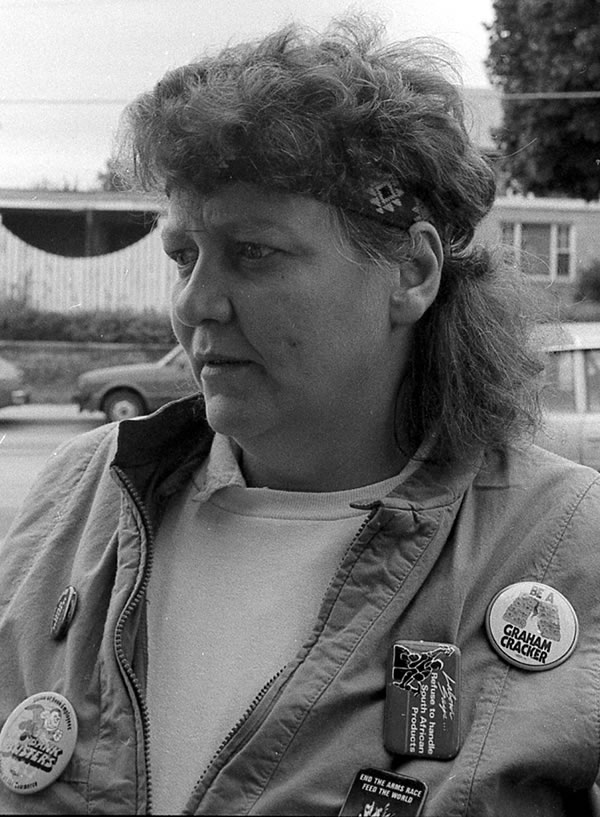Arlene Mantle
1939-2012
There was no one quite like guitar-toting Arlene Mantle, who passed away September 10. The performer with a tough, rusty Janis Joplin voice and a fill-the-room presence was a fixture in the city’s social movements, at a time when rebel troubadors were few and political action cried out for artistry.
For several decades, Mantle graced the mic at demos and conferences to sing of resistance, and cheer on activists for a range of causes from feminism, to labour rights, to third world solidarity.
Her song Moving Mountains became an anthem in the 80’s and 90’s, and her albums A Class Act, In Solidarity and On the Line, while not mass sellers, were found on the shelves of many a local social change proponent. In 1983, she toured post-coup Chile with Bruce Cockburn and shared the stage with him. (Check out the last bit of this video).
“She was so powerfully present – she sung us into our liberation,” says longtime anti-violence activist Deb Parent. “One of the things that made her unique was all of the disparate pieces she integrated being who she was: feminist, poor, a dyke, labour activist. So many different issues and causes. Rereading the words to Moving Mountains brings tears to my eyes.”
Mantle, who was poor most of her life, was a single mom from Jane Finch before movement politics propelled her onto the protest stage. She tried, at one point, to earn a living touring bars as a country singer, but didn’t think she had the glam to make it work.
Says her longtime manager, Jayne Walker, “her life was an amazing journey. She was a remarkable person; she kicked herself out of poverty and became someone respected for her mind. She was the most outspoken person I ever knew.”
Mantle’s speciality was leading collective songwriting sessions for union gatherings and movement meetings. I wrote songs with her this way – many of us did. Actually thousands. In the manner of “the folk process” a la leftie folkie Pete Seeger, Mantle had the knack for inducing people to express the hard times they were having.
I can picture her in her overalls, the guitar slung behind her back, her resonant voice teasing out stray thoughts from participants on some troubling social issue. I always thought it a minor miracle that out of this jumble of lived experiences and chatter, Mantle was able to craft a singable political message. The main theme would invariably be: don’t give up; you can win this. Parent calls her “the oral history keeper.”
Says Walker, “it was so empowering to have a song come alive in front of your eyes and then to sing the heck out of it.” In 1986, Mantle and Walker co-produced, the On the Line songbook, which included some of the hundreds of tunes birthed in this unusual way.
Sid Ryan, president of the Ontario Federation of Labour hails Mantle, as a ‘sister.’ “She had an incredible talent for working with marginalized people, and women in particular, across the Americas,” he says. “There is no doubt her music connected people and inspired them to reach beyond themselves for a better world. The labour movement mourns her loss.”
In fact, unions paid her well for her song workshops and performances; it kept her paying the rent for many years at the Bain Coop, though she would sing and write for free for any group that needed her. “She was always poor and lived close to the bone, but she never worried and was so generous,” says Walker.
She certainly was with her performances. I used to get tingly watching her blast out her blues. One of her fave standards in days gone by was Mr. Bojangles which she, true to form, always introduced it as a song about a “used up worker.”
“She lit her candle in the wind,” says the statement issued by her family. “She changed our lives with her songs and her courage to sing them. She stood for overcoming personal adversity and standing up to greed. Arlene was a life-force; she will be deeply missed.”
by Ellie Kirzner for NOW Magazine






